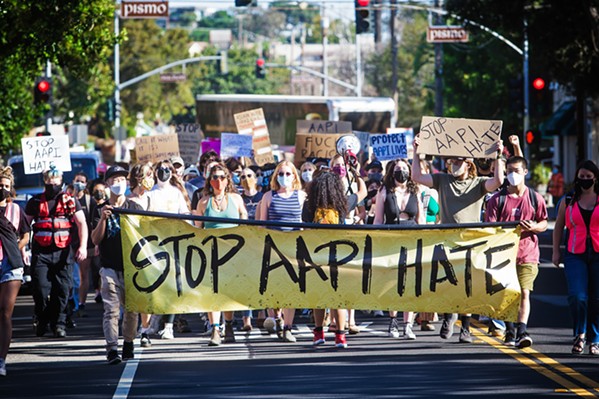More than 300 families, friends, and individuals—wearing masks—gathered at Mitchell Park and marched through the city of San Luis Obispo's downtown on April 1 to shout their support for the Asian American Pacific Islander community (AAPI) and call for unity.
The Stop AAPI Hate rally and march was organized by Kaela Lee, Mia Shin, and the Black Lives Matter Community Action in response to the Atlanta-area spa shootings in March that killed eight people, including four women of Asian descent: Hyun Jung Grant, 51; Suncha Kim, 69; Soon Chung Park, 74; and Yong Ae Yue, 63. The rally acknowledged the surge in racist violence and microaggressions against Asian Americans that coincided with the onset of the coronavirus pandemic.

- Photo By Jaysom Mellom
- COMMUNITY Stop the AAPI (Asian American Pacific Isander) Hate rally attendees chanted, "this is what community looks like" as they marched through SLO city's downtown area.
Local speaker, singer, and college ministry director Shin spoke to the crowd from the park's gazebo, saying she was present to honor the sacrifices made by parents, grandparents, and the generations before her so that she and others in the AAPI community can have what they didn't.
"Today, I'm here to say that we're going to give them a voice. The voice that they didn't have when they came [to the U.S.] and couldn't speak their language; they were oppressed, bullied, and discriminated against," she said. "So as I said, I'm a strong follower of Jesus, Korean American woman, wife, mother, educator, student, a citizen, a valuable contributor to this community for 20 years."
In her speech, Shin challenged the children in the crowd to speak up when they see someone being bullied.
"Listen up, when you see someone who's not doing the right thing and they're being mean you say, 'Stop! That's not right.' You don't pass someone by when they're hurting, you say 'How can I help you,'" she said.
Shin told the rest of the attendees to call out racism when they see it, in conversations, jokes, with strangers, and in their friend groups.
"We are here to make a difference, and I'm here to declare that Asian American voices will no longer be silenced. We will no longer be overlooked. We will no longer be victims of hate and discrimination and violence," she said.
Co-organizer Lee, a fourth-year Cal Poly student and Bay Area native, told New Times that the event isn't the solution to what the AAPI community faces, but she views it as a foundation to begin actual change.
"I have hopes that overall the Black, Indigenous, people of color (BIPOC) community can come together and support each other and each of our own forms of oppression," she said.
Lee said she's seen a trend of online behavior that she doesn't agree with, communities of color comparing their struggles to see who's been more oppressed. Instead of doing that, she said, people of color should be more supportive, acknowledging one another's experiences.
"I'm not going to say our oppressions are the same because they're not. But because we are all communities of color that have experienced oppression from white supremacy, capitalism, and colonialism, we have at least a sympathy and understanding of what each of our minority groups are going through," she said.
Lee and Shin both told New Times that SLO County and the city of SLO lack a community resource center, which could be a possible project for the future. For now, though, they're calling on the larger community to listen to their Asian American neighbors and their stories.
Instead of separating the AAPI community into its own bubble, the organizers hope the community listens to one another and supports each other.
"It'll just be a group of like-minded people getting together. That's different than true unity and true collaboration as a community," Shin said. "If something is going to happen, it's going to involve voices from several places of people who actually care about supporting and creating a multicultural presence in SLO." Δ
Comments
Showing 1-1 of 1